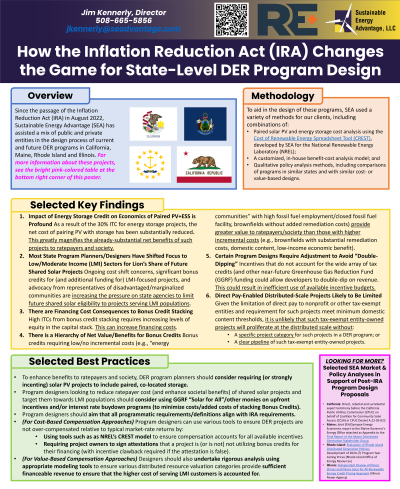Back

Regulatory Innovation and Policy Drivers
How the Inflation Reduction Act Changes the Game for State-Level DER Program Design
Tuesday, September 12, 2023
4:30 PM - 5:30 PM PDT
Location: Poster Area, Booth #11024, Level 1, Venetian Expo Hall


Jim Kennerly, n/a
Director
Sustainable Energy Advantage, LLC
Framingham, Massachusetts, United States
Poster Presenter(s)
Description and Background: As more states have moved to decarbonize their electricity supplies via aggressive, legally-binding reduction targets, an increasing number of states have moved to develop specific programs to encourage the adoption of distributed energy resources (particularly generation resources, such as solar PV and PV paired with energy storage). When developing such programs in conjunction with efforts to procure large-scale clean resources, though, state decision-makers and relevant stakeholders often find it challenging to balance core public policy objectives (encouraging a diverse mix of resources likely to reach commercial operation, siting more projects on disturbed parcels of land, and serving low- and moderate-income and environmental justice (EJ) communities) with mitigating the cost to customers. Nevertheless, the recently-enacted Inflation Reduction Act of 2022 (hereafter “IRA” or “the IRA”) creates opportunities for development of a more diverse array of projects at (or sometimes below) previous expected costs to ratepayers, and often with a higher degree of electric system and societal benefit than before. With this proposed QuickTalk, the goal is to share best practices (and discuss relevant barriers and ongoing uncertainties), including from our personal experiences advising state energy offices on the development of DER programs, regarding how to best incorporate the new tax provisions and spending from the IRA while reducing costs and enhancing benefits to ratepayers and society.
